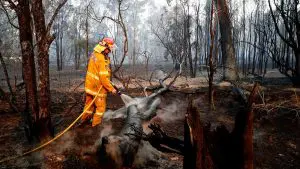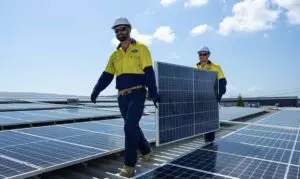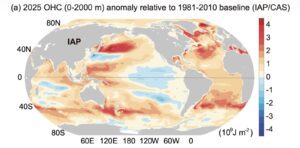The first parliamentary sitting week of 2020 quickly confirmed that Australia is set for yet another year of political in-fighting and partisan politics over the issue of climate change, and while he has lost his post as the resources minister, the exit of Matt Canavan from the cabinet is likely to see this conflict escalate.
The resignation of the parliament’s strongest pro-coal advocate from the cabinet will likely see Canavan emerge as an unabashed agitator from the government backbenches, and willing to openly undermine the Morrison-McCormack leadership to promote the interest of the fossil fuels sector.
Canavan resigned from his ministerial portfolios on the same day he declared his support for the failed bid by Barnaby Joyce to retake the leadership of the National Party, and when he admitted a link to a sporting club that had received a multi-million loan from the NAIF fund that was under his purview.
As a cabinet minister, Canavan was constrained by cabinet collective responsibility: Even though he liked to describe himself as “Mr Coal”, Canavan could advocate for his favoured position within the private meetings of the cabinet, but once a position had been agreed upon by the cabinet collectively, all ministers are then bound by convention to support the agreed position even if there is personal disagreement.
Canavan will no longer be bound by the principle of ‘cabinet solidarity’ and no is longer obliged to support the positions of the Morrison government that have been agreed by the cabinet and likely tempered by moderate ministers, as he demonstrated on Monday when he told Sky News that he would cross the floor on any issues that may negatively impact Australia’s coal sector.
“Every backbench member of the coalition has the right to form their own position on legislation the key thing you said there is if it is against the interests of my constituents,” Canavan told Sky News.
“I would ever only cross the floor if it was a severe issue that was against the interests of the people of Queensland.”
“The fact we still rely on coal-fired power for the vast majority of electricity in this country, the fact that that source of electricity is still the predominant source of energy across the world and helps millions of people get out of poverty.”
Canavan has been an open supporter of the coal and gas industries in Australia and has been outspoken against increasing action to prevent climate change. Canavan led the Morrison government’s campaigns in support of the Adani Carmichael mine during the 2019 election and told Sky News that he would continue to advocate for a stronger coal sector.
“While I’m on the backbench, I don’t intend on taking a back seat, I will still forcefully express the views of the people of Queensland, stand up for those views, and things like our great coal industry that’s our nation’s largest export,” Canavan added.
The loss of Canavan from the cabinet is likely to mean little by way of change within the resources portfolio itself, with pro-nuclear and pro-coal Queensland MP Keith Pitt taking Canavan’s place. Pitt comes with his own track record of antagonism towards the renewables sector.
One of Canavan’s main aims will be to stop any moves to adopt a meaningful long-term emissions reduction target, acting pre-emptively to show that the prospect of the Morrison government adopting a zero net emissions target is already dead on arrival.
“It seems like the kind of things that Governments say because they’re not doing much today, but they want to try and hoodwink people that they might do something in 30-years time,” Canavan said in the Sky News interview.
“It’s exactly the same as saying I’m going to lose 10 kilos in 10-years time, but not going to do anything about it today.”
Federal energy minister Angus Taylor has recently indicated that the Morrison government would announce a long-term emissions reduction target ahead of the next round of international climate change talks to be held in Glasgow towards the end of the year.
There has been some speculation that this target could be along the lines of a zero net emissions target, similar to those legislated by the governments of the United Kingdom and New Zealand.
Such a target is the subject of a private members bill drafted by independent member Zali Steggall which has recently won the backing of a wide range of stakeholders, from Greenpeace Australia to the Business Council of Australia.
The bill has been modelled of legislation passed by the parliaments of the United Kingdom and New Zealand and has been designed to achieve the same bipartisan consensus achieved in the parliaments of those countries.
Several moderate Liberals have also called on the Morrison government to adopt more ambitious climate change targets, including Sydney MPs Trent Zimmerman and Dave Sharma, who opposed the government providing financial support for a new coal-fired power station.
As a minister, Canavan spearheaded the push within the Morrison government to support the construction of a new coal-fired power station in North Queensland. Perceptions that both Morrison and McCormack have dragged their feet on the proposal led to reports of a fiery confrontation between Canavan and the prime minister and has been a likely motivation behind the recent move to oust McCormack as Nationals leader.
While McCormack is far from an enthusiastic supporter of ambitious climate action himself, refusing to say that he would support a zero emissions target in an interview with ABC Insiders, he remains bound to support the policies adopted by the full Coalition party room.
Canavan now joins Joyce on the coalition backbench, the former Nationals leader whom Canavan served under as chief of staff, and will likely seek opportunities to amplify tensions within the Nationals party room to destabilise the leadership of Michael McCormack in a bid to see Joyce return to the leadership.
During last week’s parliamentary sitting, a group of breakaway Nationals, led by Canavan and Joyce, voted to install Llew O’Brien as the deputy speaker in the federal House of Representatives. The move prevented the Coalition’s preferred candidate, Damian Drum, from taking the position, and was designed to both embarrass Morrison and McCormack as well as a clear demonstration of their ability assert their power from the backbench.
In the first episode of the podcast launched by Canavan and Joyce following the unsuccessful spill, Joyce claimed that it was “bullshit” to suggest that it was not economically viable to build a new coal-fired power station in Australia, citing examples overseas, despite analysis from the CSIRO that shows wind and solar remain the cheapest forms of new electricity generation capacity in Australia.







